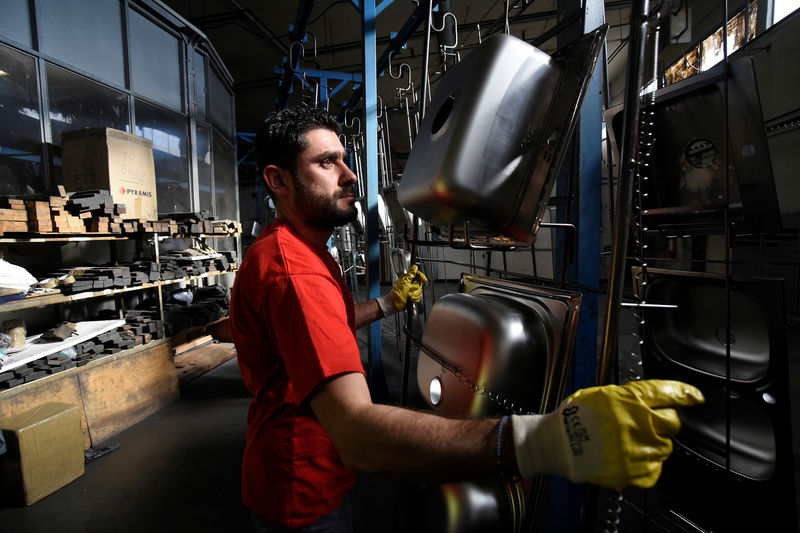 © Reuters. A worker carries stainless steel sinks at the Pyramis Metallourgia manufacturing facility in Thessaloniki
© Reuters. A worker carries stainless steel sinks at the Pyramis Metallourgia manufacturing facility in ThessalonikiBy Karolina Tagaris
THESSALONIKI, Greece (Reuters) – Nikolaos Bakatselos, chief executive of Pyramis, one of Greece’s last surviving stainless steel sink makers, says he can hardly keep up with new orders. But fewer than ever are going into Greek kitchens.
After seven years of one of the deepest recessions seen in modern times, Greek factories are beginning to hum again, as falling wages cut production costs and a recovery in the euro zone makes one of its weakest members competitive again – internationally, at least.
“All our moves are made with exports in mind,” Bakatselos said at his plant in Thessaloniki, once the industrial heartland of northern Greece but now an area ravaged by factory closures. “We’re looking at the big picture, not the small one.”
The long-awaited rebound in Greek manufacturing as well as brisk tourism, still an important industry for the Mediterranean country, may signal a turnaround for the broader economy.
Gross domestic product has grown for three straight quarters, and in a crucial step for the government and its finances, Greece borrowed in the international bond markets in July after a three-year absence.
Athens is also looking to end its third international bailout program next year, after seven years of international lender-mandated firings, cuts to wages and public spending, privatizations and other reforms.
All this pain may be beginning to pay off.
Activity in the manufacturing sector, which accounts for about 10 percent of Greece’s economy, expanded for the sixth month in November, Markit’s Purchasing Managers’ Index showed, a benchmark of wider economic activity.
At Pyramis, whose buyers include furniture retailer IKEA, exports have almost doubled since the Greek economy imploded. It has branched out into granite sinks and is even in talks on setting up its first overseas factory in the United States.
Nationwide, manufacturers hired more workers in November thanks to higher production targets, and at the fastest pace in two decades. Factory operators were more confident than ever on the prospects for growth in the coming year.
The positive Purchasing Managers’ data offered “some support to the argument that Greek economy has finally reached a turning point” and bodes well for growth in the coming months, Markit economist Alex Gill said.
OPPORTUNITY IN CRISIS
The turnaround will take time, however. After nine full years of recession from 2008 to 2016, Greece’s economy has shrunk by a quarter, reducing its output capacity and thereby its ability to respond nimbly to the long-awaited upturn.
In 2010, 80,000 factories were pumping out goods around the country, but by 2013 that number had slumped to 57,000, the latest data from Greece’s statistics service shows.
The impact of that is visible on the outskirts of Thessaloniki, where a once-thriving industrial zone that drew in thousands of workers now looks like a wasteland, overgrown with weeds and with company gates rusting away.
“We shed any fat we had,” said Bakatselos, whose father founded Pyramis nearly 60 years ago. It cut its borrowing and operating costs, while reducing its spending on equipment and wages alike.
When Greece nearly crashed out of the euro and imposed capital controls in 2015, Pyramis had to pool its money in nine subsidiaries abroad and use it to pay suppliers in cash as it imports all its materials – including coil, lubricants and plastic from Germany and Italy.
When the domestic market collapsed, the company’s biggest advantage was that it was already exporting, Bakatselos said.
Turnover has grown by 34 percent during the crisis and domestic sales now account for 16 percent of the total, compared with 34 percent in 2008, he said. It exports to every continent and has added over 15 new countries in recent years.
Beyond exports, which now benefit from strong global demand, more competitive firms have strengthened their position in the domestic market thanks to the elimination of competition, said Nikos Magginas, senior economist at National Bank.
In 2014, Pyramis, which can produce more than 1.5 million sinks annually at its Thessaloniki plant, opened a second factory in the town of Kilkis producing granite and synthetic sinks.
It hired 90 workers and bought its first machine from a competitor who shut down. It wants to raise production there to 300,000 by 2020 from about 120,000 now.
“There may have been a crisis in Greece, but the crisis creates opportunities,” Bakatselos said.
It is in talks in Michigan and Kentucky on opening a U.S. assembly plant and will spend about 2 million euros of its own funds to buy machines, equipment and basic infrastructure. Initially, the company hopes to produce about 100,000 stainless steel sinks a year there.
For all these green shoots, however, it may be too early to talk about long-term economic stability for the country.
Unemployment remains the highest in the euro zone at around 21 percent, while the national debt is still at a massive 180 percent of economic output, creating huge debt-servicing costs that limit new government spending.
Every sign of growth in the private sector is therefore a boon, but many companies remain cautious about the strength of the recovery.
“Greeks have switched off. They’re stuck on survival,” Bakatselos said.
“It’s very difficult even today to gear up and think of growth because we’re afraid of what may go wrong.”
Source: Investing.com





























